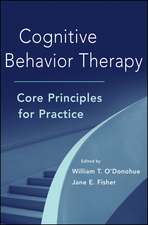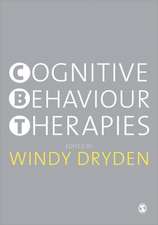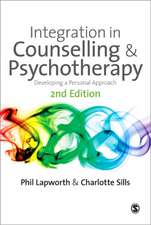Promoting Diversity and Social Justice: Educating People from Privileged Groups: Teaching/Learning Social Justice (Paperback)
Autor Diane J. Goodmanen Limba Engleză Paperback – 28 feb 2011
New features include:
- A new chapter, "The Joy of Unlearning Privilege/Oppression," highlights specific ways people from privileged groups benefit from unlearning privilege/oppression and from creating greater equity.
- A new chapter, "Allies and Action," gives focus and guidance on how people from privileged groups can constructively and appropriately be involved in social change efforts.
- Updated Appendix of additional resources.
| Toate formatele și edițiile | Preț | Express |
|---|---|---|
| Paperback (2) | 347.68 lei 3-5 săpt. | +17.48 lei 6-10 zile |
| Routledge – 28 feb 2011 | 347.68 lei 3-5 săpt. | +17.48 lei 6-10 zile |
| SAGE Publications – 9 oct 2000 | 491.86 lei 6-8 săpt. | |
| Hardback (2) | 836.77 lei 6-8 săpt. | |
| SAGE Publications – 9 oct 2000 | 836.77 lei 6-8 săpt. | |
| Taylor & Francis – 29 mar 2011 | 1479.81 lei 6-8 săpt. |
Preț: 347.68 lei
Nou
Puncte Express: 522
Preț estimativ în valută:
66.54€ • 72.25$ • 55.89£
66.54€ • 72.25$ • 55.89£
Carte disponibilă
Livrare economică 02-16 aprilie
Livrare express 18-22 martie pentru 27.47 lei
Preluare comenzi: 021 569.72.76
Specificații
ISBN-13: 9780415872881
ISBN-10: 041587288X
Pagini: 214
Ilustrații: 1 line drawing
Dimensiuni: 152 x 226 x 13 mm
Greutate: 0.32 kg
Ediția:2
Editura: Routledge
Seria Teaching/Learning Social Justice (Paperback)
ISBN-10: 041587288X
Pagini: 214
Ilustrații: 1 line drawing
Dimensiuni: 152 x 226 x 13 mm
Greutate: 0.32 kg
Ediția:2
Editura: Routledge
Seria Teaching/Learning Social Justice (Paperback)
Recenzii
"This new edition improves upon what was already an indispensable tool for educators, trainers, and activists. Written in an accessible and sympathetic voice, with concrete strategies and support, this is a text I find myself turning to again and again. If you are committed to dismantling privilege and oppression, you need this book!"
--Abby L. Ferber, Director of the Matrix Center for the Advancement of Social Equity and Inclusion, Professor of Sociology, and Women's and Ethnic Studies, University of Colorado at Colorado Springs
"Updating and extending her foundational work for a newly emerging social climate in a clear, personable, accessible, and yes, joyous style, Diane J. Goodman maintains a laser focus upon members of socially privileged groups. By so doing, she provides readers the tools they need to envision not only the concept, but most importantly, the reality of social justice."
--Warren J. Blumenfeld, Associate Professor, Department of Curriculum and Instruction, Iowa State University
--Abby L. Ferber, Director of the Matrix Center for the Advancement of Social Equity and Inclusion, Professor of Sociology, and Women's and Ethnic Studies, University of Colorado at Colorado Springs
"Updating and extending her foundational work for a newly emerging social climate in a clear, personable, accessible, and yes, joyous style, Diane J. Goodman maintains a laser focus upon members of socially privileged groups. By so doing, she provides readers the tools they need to envision not only the concept, but most importantly, the reality of social justice."
--Warren J. Blumenfeld, Associate Professor, Department of Curriculum and Instruction, Iowa State University
Notă biografică
Diane J. Goodman, Ed.D., is a trainer, college teacher, author, speaker, and consultant on diversity and social justice issues. For more information, see her website: http://www.dianegoodman.com.
Cuprins
Chapter 1: Introduction
Chapter 9: Developing and Enlisting Support for Social Justice
- Update oppression chart: add gender oppression; change "Anti-Semitism" to "Anti-Semitism and religious oppression" and list other religious minorities; discuss "border identities" (Adams, Bell and Griffin)
- New graphic to depict the intersectionality of our identities
- Update statistics
- Elaborate discussion of characteristics of privileged groups and individuals
- p. 51- correct typo, change multiplicity or subjective to relativism/procedural
- Update social identity models
- Add to reasons for resistance
- Refine chart on intervention strategies
- Add to costs of oppression
- New chapter. Describe the psychological, intellectual, interpersonal, spiritual, professional and other benefits white people experience when they have worked to unlearn racism.
- Address the similarities to and relevance for unlearning other forms of oppression as a member of the privileged group
- Move section on Benefits of Social Justice (p. 198-202) from current Chapter 10 to this chapter. Expand this section.
Chapter 9: Developing and Enlisting Support for Social Justice
- Move revised versions of the sections "Shifting the Paradigm" and "The Appeal of Partnership Relations and Social Justice to People from Privileged Groups" (pp. 190-198) from current Chapter 10 to end of this chapter.
- New Chapter. Discuss options for action, blocks to action, accountability, what it means to be an ally, challenges of being an ally, and particular issues for white men.
- Incorporate section on "From Motivation to Action: Allies and Activism" (p. 163-167) in current Chapter 8 and section on "The Need for Both Individual and Societal Change" from Chapter. 10.
- Add greater discussion of the differences for educators from dominant or subordinate groups
- Add more about dealing with triggers
- Discuss "mindful facilitation" (Lee Mun Wah)
Descriere
Descriere de la o altă ediție sau format:
This book offers educational and psychological perspectives to inform practice and increase options in addressing conflict situations. The first part of the book helps the educator understand the reasons for resistance and ways to prevent it. The second part explains how educators motivate dominant groups to support social justice. This book is an excellent resource for group facilitators, counselors, trainers in classrooms and workshops, professors, teachers, higher education personnel, community educators, and other professionals involved with educating others about diversity and equity.
This book offers educational and psychological perspectives to inform practice and increase options in addressing conflict situations. The first part of the book helps the educator understand the reasons for resistance and ways to prevent it. The second part explains how educators motivate dominant groups to support social justice. This book is an excellent resource for group facilitators, counselors, trainers in classrooms and workshops, professors, teachers, higher education personnel, community educators, and other professionals involved with educating others about diversity and equity.










